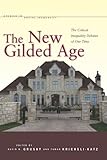The new gilded age : the critical inequality debates of our time / editado por David B. Grusky y Tamar Kricheli-Katz.
Tipo de material: TextoSeries Studies in social inequality | Studies in social inequalityEditor: Stanford, California : Stanford University Press, 2012Descripción: viii, 297 páginasTipo de contenido:
TextoSeries Studies in social inequality | Studies in social inequalityEditor: Stanford, California : Stanford University Press, 2012Descripción: viii, 297 páginasTipo de contenido: - texto
- no mediado
- volumen
- 0804759359
- 0804759367
- 9780804759359
- 9780804759366
- 305.0973 N532 2012
| Tipo de ítem | Biblioteca actual | Colección | Signatura topográfica | Copia número | Estado | Notas | Fecha de vencimiento | Código de barras | Reserva de ítems | |
|---|---|---|---|---|---|---|---|---|---|---|
| Libro | Biblioteca Central | Colección General | 305.0973 N532 2012 (Navegar estantería(Abre debajo)) | Disponible | GEN | 33409002848335 | ||||
| Reserva Libro | Biblioteca Central | Reserva Colección General | 305.0973 N532 2012 (Navegar estantería(Abre debajo)) | c. 2 | Disponible | Sala de Reserva | 33409002983306 |
Navegando Biblioteca Central estanterías, Colección: Colección General Cerrar el navegador de estanterías (Oculta el navegador de estanterías)

|

|

|

|

|

|

|
||
| 305.0800723 J67s 1990 Selecting ethnographic informants / | 305.0971 S678 1993 Social inequality in Canada : patterns, problems, policies / | 305.0972 P739 1993 Población y desigualdad social en México / | 305.0973 N532 2012 The new gilded age : the critical inequality debates of our time / | 305.2 E61 2005 Entre la familia, la sociedad y el estado : niños y jóvenes en América Latina (siglos XIX-XX) / | 305.2 G914 1977 La aceptación de si mismo / | 305.2 M333g 1989 Generaciones y constelaciones / |
Incluye bibliografía.
Introduction : poverty and inequality in a new world / David B. Grusky and Tamar Kricheli-Katz -- Rich and poor in the world community / Peter Singer -- Global needs and special relationships / Richard W. Miller -- (Some) inequality is good for you / Richard B. Freeman -- Inequality and economic growth in comparative perspective / Jonas Pontusson -- Rising inequality and American politics / John Ferejohn -- Unequal democracy in America: the long view / Jeff Manza -- A human capital account of the gender pay gap / Solomon Polachek -- The sources of the gender pay gap / Francine D. Blau -- A dream deferred : toward the U.S. racial future / Howard Winant -- Racial and ethnic diversity and public policy / Mary C. Waters.
Income inequality is an increasingly pressing issue in the United States and around the world. This book explores five critical issues to introduce some of the key moral and empirical questions about income, gender, and racial inequality: Do we have a moral obligation to eliminate poverty? Is inequality a necessary evil that´s the best way available to motivate economic action and increase total output? Can we retain a meaningful democracy even when extreme inequality allows the rich to purchase political privilege? Is the recent stalling out of long-term declines in gender inequality a historic reversal that presages a new gender order? How are racial and ethnic inequalities likely to evolve as minority populations grow ever larger, as intermarriage increases, and as new forms of immigration unfold? Leading public intellectuals debate these questions in a no-holds-barred exploration of our New Gilded Age.
No hay comentarios en este titulo.
